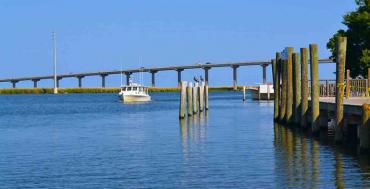
Even if the U.S. Supreme Court gives Florida a favorable ruling in its lawsuit against Georgia over water flow into the Apalachicola River, the decision likely would result in more litigation and new legal challenges involving the decades-old water war between the states.
Those were the observations of five legal experts who on Thursday addressed a conference at Florida State University on the Apalachicola River and Apalachicola Bay system. The conference was put together by the Florida Conservation Coalition, a group headed by former U.S. Sen. and Gov. Bob Graham.
The U.S. Supreme Court in January heard oral arguments in Florida’s challenge to a special master’s report that found Florida had not proved its case that a water-usage cap should be imposed on Georgia to help the river and Apalachicola Bay. Georgia has asked the nation’s highest court to uphold the report, arguing that a consumption cap would damage Georgia’s economy and agriculture industry.
Florida has asked for the case to be sent back to the court-appointed special master for more hearings on a plan for an “equitable” distribution of water in the Apalachicola-Chattahoochee-Flint river basin.
Although the lawyers on Thursday’s panel and Florida officials have expressed optimism about the case based on the tone of justices’ questions during oral arguments, Jonathan Williams, a former deputy solicitor general for the state, said he was taking a cautious view.
“Oral arguments are often not great predictors of what the ultimate outcome is going to be, particularly in cases that are as complicated as this one is,” said Williams, who was involved in the case while he was with the Attorney General’s Office. He is now in private practice with the firm Lash & Goldberg.
Although the arguments “went well,” Williams said. “there are a lot of unsettled issues in this case right now, and there are a lot of thorny issues the special master will have to work through in the event the case gets remanded to him.”
If the case continues, a key issue in developing an “equitable apportionment” of water in the river system would be weighing the benefits to Florida against the cost to Georgia. Florida has said a diminished water flow has harmed the Apalachicola ecosystem as well as the seafood industry, while Georgia has said a consumption cap could hurt the economic growth of the Atlanta region and impact a multibillion-dollar agriculture industry in Southwest Georgia.
Richard Hamann, a retired law professor from the University of Florida, said he is “pretty optimistic” about Florida’s case, having once thought the state would have difficulty proving harm had been done.
But if Florida wins the current case, he likened it to “the dog chasing the car.”
“When you catch it, what do you get?” he asked. He said it may be difficult developing an accurate mechanism to measure a consumption cap.
“If we get there, I think that would be a huge challenge,” Hamann said. “But I certainly look forward to seeing that day.”
Jason Oyler, a lawyer with the Susquehanna River Basin Commission in Pennsylvania, said the case would likely lead to more litigation that could “go on for decades upon decades.”
He and other lawyers on the panel said there are relatively few water cases decided by the U.S. Supreme Court to give a clear indication of the outcome of the Florida-Georgia case.
“I think there could be twists and turns, even with a relatively favorable ruling, on that kind of economic analysis,” he said. “And there are some pitfalls there.”
Melissa Samet, a lawyer with the National Wildlife Federation, described a related lawsuit challenging a U.S. Army Corps of Engineers water-management plan for the river basin issued last year.
Samet said her organization filed a legal challenge to both the “water control manual” as well as the environmental impact statement that accompanied the plan. The case was filed in Washington, D.C., and joined a similar lawsuit filed by Alabama, also challenging the water plan and environmental document.
She said the water control manual, as well as the environmental statement, failed to adequately assess the impact of the diminished water flow into the Apalachicola system, including its impact on plant and animal life, and did not explore “reasonable” alternatives.
“The fundamental goal of our lawsuit is really to ensure that the Corps is using the legal tools that it has available to it, to issue a revised water control manual that restores a more natural flow pattern to the Apalachicola,” she said.
Mohammad Jazil, a lawyer with the firm Hopping, Green & Sams, said it would be difficult to overturn the Corps’ decision given that federal law is “deferential” to actions by government agencies.
“The Corps is presumed to be the expert and presumed to be right,” he said.
Samet acknowledged the deferential standard, but she said the Corps actions were so “egregious” in ignoring mandates like the National Environmental Policy Act in the development of the basin plan that “I think we have a really good shot.”


